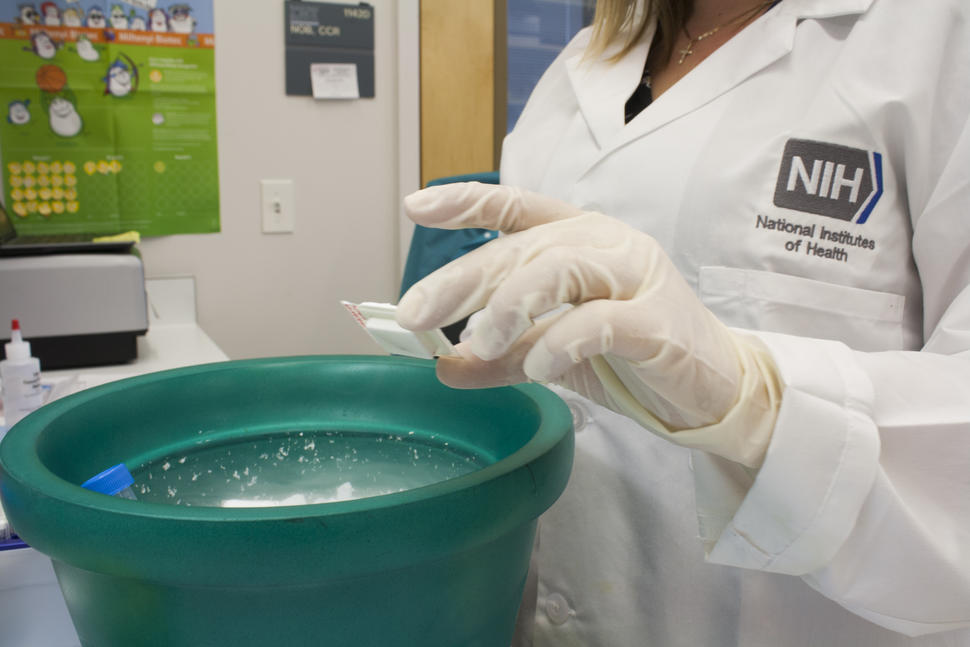New Multi-Institutional Study Analyzes Tumor Tissue and Patient Data to Improve Care
, by Brittany Cordeiro, NCI-CONNECT Program Manager
Studying tumor tissue and clinical data across our national network of institutions will help researchers advance their knowledge of rare brain and spine tumors faster.
NCI-CONNECT is launching a study across its network of clinical collaborators to better understand rare brain and spine tumors. The study collects tumor tissue and comprehensive clinical data from deceased patients with rare brain and spine tumors, and people who were pregnant at diagnosis (or became pregnant after diagnosis).
“The data are out there waiting to be analyzed and understood. The more data we collect, the better we can design clinical trials and study therapeutic options that improve the outcomes of patients,” says Marta Penas-Prado, M.D., principal investigator of the study and an associate research physician in the NCI Center for Cancer Research's Neuro-Oncology Branch.
The Tissue Outcomes Study is collecting valuable information from adults who lived with rare brain and spine tumors. This information has never been analyzed before at this large scale. Due to the low frequency of these tumors, it is very challenging to collect and analyze large series with both comprehensive information about the tumor's molecular makeup and the clinical history of the people who had it—including data such as the location and extension of the tumor, the treatments they received, or how the tumor responded to them.
The study has two components. The main focus is to study 11 different rare types included in our NCI-CONNECT program. A special part of the study, called the Pregnancy Sub Study, is dedicated to studying the effects of pregnancy on all primary brain tumor types and is being led by Shlomit Yust-Katz, M.D., of Rabin Medical Center in Israel.
The rarity of the tumor types means there is a scarcity of proven therapies and limited understanding of how a tumor's molecular makeup relates to the natural history and response to treatment. Additionally, the rarity of pregnancy during the course of a brain tumor limits our understanding of the effect of pregnancy on how the tumor grows and responds to treatment.
The NCI-CONNECT study is breaking silos by working across its national network of 33 institutions to collect a large number of cases, allowing more comprehensive analysis and advancing knowledge faster.
Studying Tissue Outcomes
The Tissue Outcomes Study is collecting tumor tissue paired with comprehensive clinical data for two primary objectives.
- To study the clinical course of rare tumors in adults. This includes analyzing the impact of the patient, tumor, and therapy-related factors and correlating those with outcomes (progression-free interval and overall survival).
- To identify clinically relevant molecular markers. These markers will be evaluated from previously collected tumor tissue to define molecular subtypes, predict response to therapy, and determine high-risk molecular signatures for aggressive tumor behavior. The tumor tissue will be analyzed by NCI’s Laboratory of Pathology, led by study co-principal investigator Kenneth Aldape, M.D.
The data are being collected from deceased and "lost to follow" patients (patients who came for several clinical visits but were lost track of) and will be de-identified. (Patients who are alive can participate in the Natural History Study instead.)
“The plan is to develop a database where information is collected. Then, specific questions can be asked, and tumor responses and behavior can be predicted,” says Dr. Penas-Prado. The ultimate goal is to design research studies and clinical trials that improve treatment options.
Studying Pregnancy
The Pregnancy Sub Study collects data about the influence of pregnancy on prognosis of adult patients with primary brain tumors. The tumor tissue will also be analyzed at NCI to better understand its microenvironment, genetic alterations, and hormonal receptors.
“Unfortunately, there is little documentation regarding the impact of pregnancy on brain tumor biology, with the most concerning aspect being the potential for stimulating or accelerating growth,” says Dr. Penas-Prado. To date, only relatively small retrospective studies have been conducted.
The Pregnancy Sub Study is different from these previous studies, because it will be much larger and will comprehensively analyze the impact of pregnancy on patients with primary brain tumors. This could help provide the information necessary for counseling patients who are considering pregnancy, or whose brain tumor is discovered during pregnancy.
The guidance for brain tumor patients would be further enhanced if the mechanisms by which pregnancy alters tumor biology could be discovered. There is potential that tumors at high risk of progression during pregnancy can be defined by molecular markers.
Impact for Neuro-Oncology
We want to collect all possible information from people who suffered from rare tumors. Every piece of information from every patient is extremely valuable.
The study has the capacity to include tissue and data from up to 1,500 patients, and Dr. Penas-Prado hopes to get as close to that number as possible over the next couple of years. “The study has the potential to change the field of neuro-oncology for adults with these rare tumors, much like other studies have done for certain tumor types, such as the CERN tissue study for ependymoma,” says Dr. Penas-Prado.
Including the clinical collaborators from the Brain Tumor Trials Collaborative and NCI-CONNECT networks means more data collected and more questions answered—which will ultimately help researchers move the field forward.
